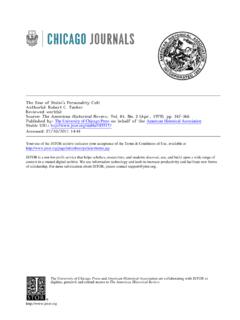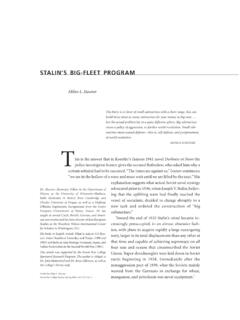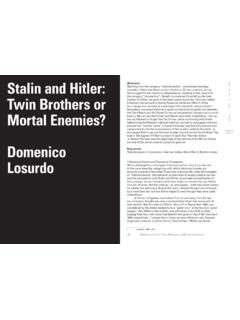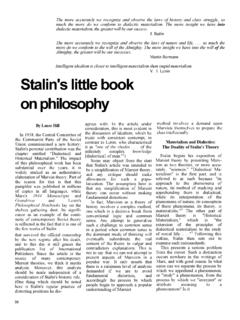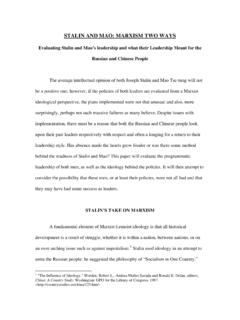Transcription of STALINISM: A STUDY OF INTERNAL COLONIALISM by Alvin W ...
1 STALINISM: A STUDY OF INTERNAL COLONIALISM by Alvin W. Gouldner "DZHUGASHVILI, JOSEF VISSARIONOVICH: peasant from the village of Didi-Lido, Tiflis district; born 1881 of Orthodox faith, attended Gori church school and Tiflis theological seminary ..Description: height, 2 arshins, 4V vershki (about 5 feet, 4 inches), average build; gives the appearance of an ordinary person." Czarist Police Description of Stalin, May 1, 1904 The Stalinist past still shapes Soviet society today, even if no longer defining it. Nowhere is this more evident than in the crises of procurement with which Soviet agriculture recurrently beset the Soviet economy.
2 From the October Revolution to d tente, the peasantry have been a destiny for the Soviet State. This, however, need not have been the case : that "destiny" was a man-made one. If the "thaw" of 1956 was short-lived, this is not surprising considering that it had been ushered in by one of Stalin's closest political associates, the sturdy survivor, Nikita Krushchev. Krushchev's expos was thus not a critique of the surreal social system whose chief architect Stalin had been, but of Stalin the man, his "sickly suspicions," and his "crimes against socialist legality."1 Louis Althusser is correct in seeing the profound limits of Krushchev's critique of Stalinism and of any other that merely sees it as a departure from Soviet legality, while overlooking its embedding in the fundamental structures of Soviet society and of the organizational culture of the This, however, is a commonplace deemed worthy of public utterance only by those whose life commitments confine them within the inane limits of official Communist discourse, and who, with leaden earnestness, debate whether Stalinism was a "deviation" or merely an "error.
3 "3 Copyright 1978 by Alvin W. Gouldner. 1. While Stalin's crimes clearly placed him in the super-criminal class, it never occurred to Krushchev that Stalin was to be viewed as one of those ordinary criminals known as statesmen : "Taking the state wherever found," Nock observed, "one sees no way to differentiate the activities of its founders, administrators, and beneficiaries from those of a professional-criminal class." 2. Louis Althusser, Essays in Self-Criticism (London, 1975). Translated by Grahame Lock. It is revealing that Althusser manages to miss the humanly liberative character of Krushchev's expos , which buoyed even Althusser's own project for an anti-humanist Marxism with its quixotic quest for freedom-within-Stalinism.
4 As usual, Althusser presents only programmatic theatrics; never actually presenting his own critique, he allows it to be leaked by his student and translator, Grahame Lock. Thus, he brazenly condemns Krushchev's speech at the 20th Congress of the CPSU as a "critique from the right," reducing it, with his typical "theoreticism," to a theoretical diagnosis, thereby missing its liberative character as a political act which had the almost immediate consequence of freeing some 5,000,000 political prisoners in the Soviet Union, whose massive presence could not but profoundly affect the entire public atmosphere of the USSR.
5 Moreover, Althusser apparently writes in ignorance of the fact that Khruschev's revelations at the 20th Congress were an impromptu act of great personal and political courage, and that his revelations at the 22nd Congress in 1961, made in open not closed session, were even more damning in their implications than his first talk. 3. See, for example, the depressing piece by that otherwise erudite scholar, Valentino Gerratana, "Althusser and Stalinism," New Left Review, January 1977. 6 / TELOS Today an analysis of Stalinism is not an inconsequential exercise.
6 Although it is an historical event, Stalinism is also potentially recurrent. The cruel repression in Cambodia indicates that Stalinism is hardly a dead issue and Kim II Sung's regime in North Korea is also essentially a personal dictatorship very much along Stalinist lines. While mass arrests and purges have ended in the USSR, repression of all dissent remains. Moreover, Soviet society has never publicly confronted its Stalinist past4 even to the very modest extent that German society, after II, confronted its Nazi past, or that American society debated and agonized over the invasion of Viet Nam.
7 Krushchev's "secret speech" of 1956 before the 20th Congress of the CPSU, in which he denounced Stalin's "cult of personality" was just that a speech for an elite rather than a public event. The liberation of Soviet and of East European societies under its domination, from the heritage of Stalinism thus remains a world problem. The discussion of Stalinism has been much conditioned by the recent history of the New Left and the political context of cold war anti-Communist obsessions during the fifties when it was difficult to seek social change without being accused of being pro-Communist. Those, like the New Left, who refused to surrender to the status quo, simply had to turn their back on the issue of Communism and refuse to be diverted by it.
8 As a result, the New Left never came to terms with the meaning and sources of Stalinism, so that, when it collapsed in the late 1960s, many of its participants reverted to varieties of old left Stalinism. Of course, even some old left anti-Stalinist socialists have felt that Stalinism was a tacit indictment and an embarrassment to socialism as such and preferred not to expose it to public This phenomenon has now ironically spread also to the most conventional and reactionary elements in American life. With the development of d tente between the Soviet Union and the United States there is a growing vested interest in the sale of American grain and technologies to the USSR.
9 Seeing new 4. Those who consider Stalinism a closed phase of Russian history need only ask dissidents who have been fired from their jobs, placed in insane asylums, denied travel permission, forced into exile, attacked on the streets, or had their apartments ransacked; let them ask Sakharov, Sol-zhenitsyn, and the writers of the Samizdat. Smith has some pointed commentary on this : "For the greatest moral issue in Soviet history, Stalinism, has been suppressed and, from all outward signs, the youth generation of the seventies is growing up with a severely stunted historical memory of that time.
10 The Party elders have decreed that the Stalinist repressions are a closed to be publicly .Their sense of moral innocence is as unshaken today as was that of Americans before the awful agony of Vietnam introduced to some a sense of national guilt and capacity for evil. Protecting Russians from that sense, I suspect, is one reason why the Soviet leadership has felt it so terribly important to suppress not just the truth about the Stalinist purges, but also the recognition that millions participated in these bloody repressions." Hedrick Smith, The Russians. (New York, 1976), pp.



